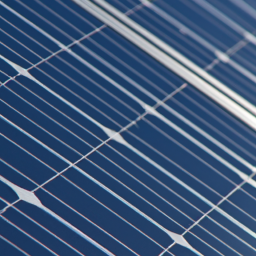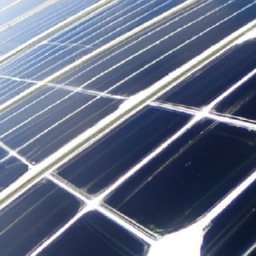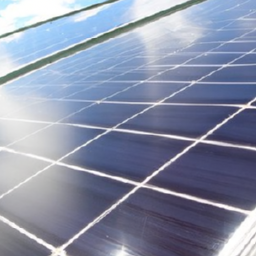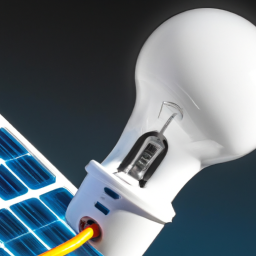In this article, you will learn about the potential of using a solar generator as a backup power source during power outages. You may be wondering if a solar generator is a reliable and effective solution when the grid goes down. Well, the answer is yes! With advancements in solar technology, solar generators have become a viable option for providing backup power during emergencies.
Solar generators harness the sun’s energy and convert it into electricity, which can then be stored in batteries for later use. This means that even if the power goes out, you can still have access to electricity to power essential appliances and devices. solar generators are portable and easy to set up, making them a convenient and practical choice for backup power. By using clean and renewable energy from the sun, you can also reduce your carbon footprint and contribute to a more sustainable future. So, if you’re looking for a reliable backup power source, a solar generator is definitely worth considering!
Overview of Solar Generators
Definition of a solar generator
A solar generator, also known as a solar power station, is a portable device that converts sunlight into electrical energy to provide power supply. It consists of solar panels, an inverter, a charge controller, and a battery. This innovative technology harnesses solar energy and stores it in batteries for later use.
How solar generators work
Solar generators work by capturing sunlight through photovoltaic cells, which are typically made of silicon. These cells convert sunlight into direct current (DC) electricity. The inverter then converts the DC electricity into alternating current (AC) electricity, which is commonly used to power household appliances and devices. The charge controller ensures that the batteries are charged efficiently and protects against overcharging.
Benefits of using solar generators
There are several benefits to using solar generators, especially during power outages. Firstly, they rely on a renewable and abundant source of energy – the sun. Solar energy is clean, sustainable, and does not produce harmful emissions like traditional power sources. Secondly, solar generators provide independence from the traditional electrical grid, which means you can have power even when the grid goes down. Lastly, investing in a solar generator can lead to long-term cost savings as you reduce your reliance on expensive utility bills.
Understanding Power Outages
Causes of power outages
Power outages can be caused by a variety of factors, including severe weather conditions such as storms, hurricanes, or extreme temperatures. Additionally, accidents, equipment failures, and maintenance work can also lead to temporary disruptions in the power supply.
Duration of power outages
The duration of power outages can vary greatly depending on the cause. While some outages may last only a few minutes or hours, others can extend for days or even weeks. The length of the outage is determined by the severity of the situation and the time it takes for utility companies to restore power.
Impact of power outages on daily life
Power outages can have a significant impact on daily life. They can disrupt essential services such as lighting, heating, refrigeration, and communication. Without electricity, individuals may face difficulties performing everyday tasks, cooking meals, and accessing crucial medical equipment. Having a reliable backup power source becomes crucial during these challenging times.
Solar Generators as Backup Power Sources
Ability to provide backup power
Solar generators excel in providing backup power during power outages. Since they rely on solar energy, they can continue to generate electricity as long as there is sunlight available. This makes them an excellent alternative or supplement to traditional backup power options, such as diesel generators or portable power banks.
Suitability for powering essential devices
Solar generators can power essential devices and appliances, such as lights, cell phones, laptops, refrigerators, and even medical equipment. However, it is important to consider the capacity of the solar generator and the power requirements of the devices you intend to use during an outage. It is always advisable to prioritize essential devices to ensure that they receive power in case of an emergency.
Charging and storing energy
Solar generators charge their internal batteries by converting sunlight into electricity. Once fully charged, these batteries can store the energy for later use, even when the sun is not shining. This stored energy can then be utilized during power outages, providing a reliable and continuous source of electricity. It is important to periodically recharge the batteries using sunlight to ensure they are ready to power devices when needed.
Advantages of Using Solar Generators during Power Outages
Eco-friendly and renewable source of energy
One of the significant advantages of using solar generators during power outages is their eco-friendly nature. Solar energy is a renewable resource that does not deplete our planet’s finite resources. By harnessing the power of the sun, we can reduce our carbon footprint and contribute to a cleaner and greener world.
Independence from the traditional electrical grid
Solar generators provide independence from the traditional electrical grid. This means that even during power outages, you can still have access to electricity. Whether you live in a remote area or are concerned about the reliability of the grid, a solar generator can provide peace of mind knowing that you have a backup power source.
Cost savings in the long run
Investing in a solar generator can lead to long-term cost savings. While the initial cost of purchasing a solar generator may be higher compared to other backup power options, such as diesel generators, the ongoing operational costs are significantly lower. Solar energy is free, and once you have paid for the equipment, you can generate electricity without additional expenses.
Considerations for Using Solar Generators
Solar generator capacity
When considering a solar generator for backup power, it is important to assess its capacity. The capacity refers to the amount of electricity the generator can produce and store. You need to determine the power requirements of the devices you intend to power during an outage and choose a solar generator with sufficient capacity to meet those needs.
Battery storage capacity
Battery storage capacity is another crucial consideration when using solar generators. The battery capacity determines how long the generator can power devices without access to sunlight. If you anticipate extended power outages, it may be beneficial to invest in a solar generator with a larger battery storage capacity.
Amount of sunlight required
Solar generators rely on sunlight to generate electricity. Therefore, it is essential to consider the amount of sunlight available in your location. Areas that receive more sunlight for extended periods are ideal for solar generators as they can produce more electricity and charge the batteries more efficiently. However, even in areas with less sunlight, solar generators can still provide a valuable source of backup power, albeit with lower energy production.
Types of Solar Generators for Backup Power
Portable solar generators
Portable solar generators are compact and lightweight, making them easy to transport and set up. They are suitable for individuals who require a temporary backup power source, such as campers, outdoor enthusiasts, or those living in apartments. Portable solar generators are typically smaller in capacity but can still provide enough power to charge small devices and run essential appliances.
Home solar backup systems
Home solar backup systems are designed to power an entire house during a power outage. They are larger and have more significant capacity compared to portable solar generators. Home solar backup systems require professional installation and connection to the electrical panel of the house. They can provide a seamless transition between grid power and solar power during outages, ensuring uninterrupted electricity supply to all the devices and appliances in your home.
Hybrid solar generators
Hybrid solar generators combine the benefits of solar energy and another power source, such as a gasoline or propane generator. These systems automatically switch between solar power and the backup power source, ensuring a continuous supply of electricity. Hybrid solar generators are ideal for areas with limited sunlight or for individuals who require additional power capacity during prolonged outages.
Common Misconceptions about Solar Generators
Inability to produce power in cloudy weather
A common misconception about solar generators is that they cannot produce power in cloudy weather. While it is true that solar panels are most effective under direct sunlight, they can still generate electricity on cloudy days. The amount of electricity produced may be reduced compared to sunny conditions, but solar generators can still provide a valuable source of backup power, even in less favorable weather.
Limited power output
Some people believe that solar generators have limited power output and can only power small devices. While it is true that the capacity of solar generators may vary, there are models available that can power larger appliances and devices. It is essential to choose a solar generator with the appropriate capacity to meet your power requirements.
Complexity of installation
Solar generators are often perceived as complex to install and operate. However, most portable solar generators are designed to be user-friendly, with simple setup instructions and plug-and-play functionality. Home solar backup systems may require professional installation, but once installed, they are relatively easy to operate. If you have any concerns about installation or operation, it is advisable to consult the manufacturer’s instructions or seek professional assistance.
Maintenance and Safety Measures
Cleaning solar panels
Regular maintenance is essential to ensure the optimal performance of solar generators. This includes cleaning the solar panels to remove any dirt, dust, or debris that may affect their efficiency. Cleaning can be done using a soft brush or cloth and water. It is important to follow the manufacturer’s instructions and safety guidelines when cleaning the panels.
Inspecting and replacing components
Periodic inspections of the solar generator components are also important to identify any issues or potential problems. This includes checking the integrity of the solar panels, inverter, charge controller, and batteries. If any component shows signs of damage or malfunction, it should be promptly repaired or replaced. It is recommended to consult the manufacturer or a professional technician for any component replacements or repairs.
Safety precautions during use
When using a solar generator, it is essential to follow basic safety precautions. This includes reading and understanding the manufacturer’s instructions, avoiding overloading the generator, and keeping it away from flammable materials. It is also important to ensure proper ventilation to prevent overheating and to handle the generator and its components with care.
Comparing Solar Generators with Other Backup Power Options
Solar generators vs traditional diesel generators
Solar generators have several advantages over traditional diesel generators. Firstly, solar generators are quiet and produce zero emissions, making them more environmentally friendly. Secondly, solar energy is a renewable resource, while diesel fuel is non-renewable and can be expensive. Lastly, solar generators require less maintenance and have lower operational costs compared to diesel generators.
Solar generators vs portable power banks
Portable power banks are compact and convenient for charging small devices on the go. However, they have limited capacity and may not be suitable for powering larger appliances or devices during power outages. Solar generators, on the other hand, have larger capacity and can provide a continuous source of power for a longer duration. They are more versatile and can power a wider range of devices during outages.
Solar generators vs grid battery systems
Grid battery systems are another option for backup power during outages. These systems store electricity when it is available, often during off-peak times, and release it during peak demand or outages. While grid battery systems are effective, they are usually connected to the electrical grid and may not provide power during widespread grid failures. Solar generators, however, are stand-alone systems and can operate independently, providing a reliable backup power source in any situation.
Conclusion
In conclusion, solar generators can be used as a reliable backup power source during power outages. They provide a sustainable and renewable source of energy, reduce dependence on the traditional electrical grid, and offer long-term cost savings. When considering a solar generator, it is important to assess capacity, battery storage, and sunlight availability to ensure it meets your specific needs and circumstances. By understanding the benefits, considerations, and comparisons with other backup power options, you can make an informed decision about using solar generators as a backup power source during power outages.




